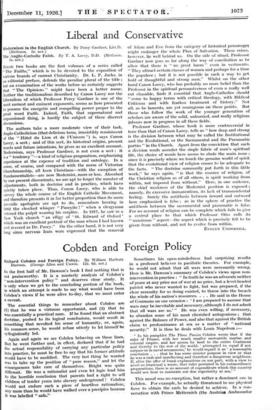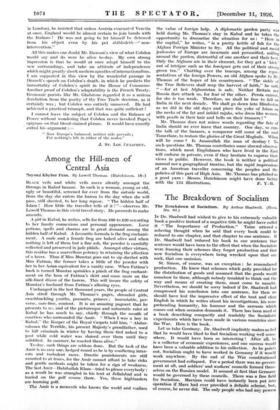Cobden and Foreign Policy
Richard Cobden and Foreign Policy. By William Harbutt Dawson. (George Allen and Unwire. 12s. 6d. not.) Ix the first half of Mr. Dawson's book I find nothing that is not praiseworthy. It is a masterly analysis of Cobden's non-intervention policy " and deserves close study. It is only when we get to the concluding portion of the book, in which an attempt is made to say what would have been Cobden's views if he were alive to-day, that we must enter a caveat.
The essential things to remember about Cobden are (1) that he was a virtuous opportunist, and (2) that he Was essentially a practical man. If he found that an abstract doctrine, pushed to its logical conclusions, would result in something that revolted his sense of humanity, or, again, his common sense, he would refuse utterly to let himself be syllogistically led.
Again and again we see Cobden behaving on these linds. But he went further and, in effect, declared that if he had the actual responsibility of carrying any particular poliCy into practice, he must be free to say that his former attitude Would have to be modified. The very last thing he wanted was to take up the position of " pure reason," and let the consequences take care of themselves. Bright was quite different. He was a rationalist and even let logic lead him to the horrible conclusion that parents had a right to sell children of tender years into slavery underground 1 Cobden Would not endure such a piece of heartless rationalism, any more than he would have walked over a precipice because it was labelled " safe."
Sometimes his open-mindedness had surprising results in a professed believer in pacifistic theories. For example,
he would not admit that all wars were necessarily wrong. Here is Mr. Dawson's summary of Cobden's views upon non- intervention in practice : " In truth he was an advocate neither of peace at any price nor of war at no price, but a level-headed patriot who never wanted to fight, but was prepared, if the clear necessity for so doing existed, to throw into the breach the whole of his nation's resources.. . . He said in the House of Commons on one occasion : I am prepared to assume that wars may be inevitable and necessary, although I do not admit that all wars are so.' " He was even willing, if necessary, to abandon some of his most cherished antagonisms ; that against the Balance of Power, and also that against the British claim to predominance at sea as a matter of " national security." It is thus he deals with Louis Napoleon ;— " In his pamphlet The Three Panics Cobden wrote that if the ruler of France, with her much smaller mercantile marine and colonial empire, and her access by land to the entire Continent and thereby to the rest of the world, ' attempted to equal if not surpass us in naval armaments,' he would regard it as a reasonable conclusion . . . that ho has some sinister purpose in view or that he was a rash and unreflecting and therefore a dangerous neighbour. If, after the offer of frank explanations on our part, with a view to avert so irrational a waste, that ruler persisted in his extraordinary preparations, there is no amount of expenditure which this country would not bear to maintain our due superiority at sea.' " This mood was no exception, but rather a dominant one in Cobden. For example, he actually threatened to use physical force to obtain the ends he desired to achieve. In a con- versation with Prince Metternich (the Austria' Ambassador in London), he insisted that unless Austria evacuated Venetia at once, England would be almost certain to join hands with the Italians ! He was not going to let himself he deterred- from his object even by his pet shibboleth—" non- intervention."
All this makes one doubt Mr. Dawson's view of what Cobden would say and do were he alive to-day. My own strong impression is that he would at once adapt himself to the new surroundings, and take an attitude of independence which might greatly shock modern apostles of internationalism. I am supported in this view by the wonderful passage in Disraeli's speech on Cobden's death, in which he predicts the Immortality of Cobden's spirit in the House of Commons. Another proof of Cobden's adaptability is the French Treaty. Economic purists like Mr. Gladstone regarded it as a serious dereliction from the purity of the Free Trade doctrine, as it certainly was ; but Cobden was entirely unmoved. He had achieved a practical triumph, and that was quite sufficient !
I cannot leave the subject of Cobden and the Balance of Power without wondering that Cobden never invoked Pope's epigram on that blood-stained phrase. It would have exactly suited his argument :- " Now Europe's balanced, neither side prevails ; For nothing's left in either of the scales."
J. ST. LOE ST3ACIIET.















































 Previous page
Previous page